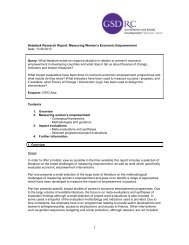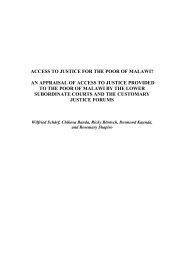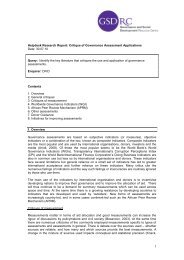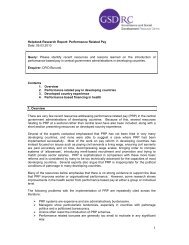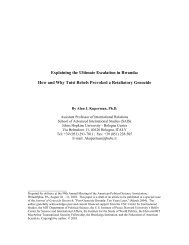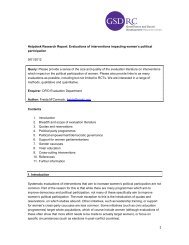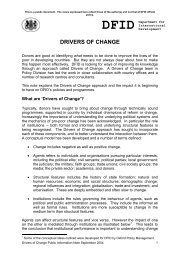Decentralisation, Local Development and Social Cohesion - GSDRC
Decentralisation, Local Development and Social Cohesion - GSDRC
Decentralisation, Local Development and Social Cohesion - GSDRC
You also want an ePaper? Increase the reach of your titles
YUMPU automatically turns print PDFs into web optimized ePapers that Google loves.
<strong>Decentralisation</strong>, <strong>Local</strong> <strong>Development</strong> <strong>and</strong> <strong>Social</strong><strong>Cohesion</strong>: An Analytical ReviewZoë Scott<strong>GSDRC</strong> Research PaperMay 2009
About the <strong>GSDRC</strong>The Governance <strong>and</strong> <strong>Social</strong> <strong>Development</strong> Resource Centre (<strong>GSDRC</strong>) provides cutting-edgeknowledge services on dem<strong>and</strong> <strong>and</strong> online. It aims to help reduce poverty by informing policy<strong>and</strong> practice in relation to governance, conflict <strong>and</strong> social development.<strong>GSDRC</strong> Research PapersResearch Papers from the <strong>GSDRC</strong> address priority agendas in international development,including emerging issues. This paper was prepared for the European Commission (EC).For more information on <strong>GSDRC</strong> services <strong>and</strong> publications, see www.gsdrc.org© International <strong>Development</strong> Department, University of Birmingham, 2009
ContentsIntroduction 4Part I: General Findings 5Part II: <strong>Decentralisation</strong> <strong>and</strong> Service Delivery 6Part III: <strong>Decentralisation</strong> <strong>and</strong> Economic <strong>Development</strong> 10Part IV: <strong>Decentralisation</strong> <strong>and</strong> <strong>Social</strong> <strong>Cohesion</strong> 14Bibliography 20
IntroductionThis analytical review explores the links between decentralisation <strong>and</strong> service delivery,economic development <strong>and</strong> social cohesion. It is not a comprehensive literature review, <strong>and</strong>only draws on material published post 2003. Instead the review seeks to define the nature<strong>and</strong> extent of the impact of decentralisation on service delivery, economic development <strong>and</strong>social cohesion, <strong>and</strong> identify factors that influence the effects of decentralisation indeveloping countries. Various types of literature have been reviewed, including academicjournal articles, donor reports <strong>and</strong> empirical case studies from Asia, Africa <strong>and</strong> LatinAmerica. Policy implications can be found at the end of each section, outlining key issues inhow decentralisation reforms could be designed to improve local development <strong>and</strong> socialcohesion.The review has been divided into four main parts:• Part I: General Findings• Part II: <strong>Decentralisation</strong> <strong>and</strong> service delivery• Part III: <strong>Decentralisation</strong> <strong>and</strong> local economic development• Part IV: <strong>Decentralisation</strong> <strong>and</strong> social cohesion.Types of decentralisationAt this point it is worth outlining the different definitions of decentralisation. There are threedistinct elements of decentralisation 1 :• Fiscal decentralisation, entailing the transfer of financial resources in the form ofgrants <strong>and</strong> tax-raising powers to sub-national units of government• Administrative decentralisation, (sometimes referred to as deconcentration), wherethe functions performed by central government are transferred to geographicallydistinct administrative units• Political decentralisation where powers <strong>and</strong> responsibilities are devolved to electedlocal governments. This form of decentralisation is synonymous with democraticdecentralisation or devolution.The majority of papers included in this review focus on the third type: politicaldecentralisation or devolution. Over the last two decades it is this type of decentralisationwhich has been primarily emphasised in developing countries.1 These definitions are taken from Robinson 2007b, p.7.4
1) Political incentives at central <strong>and</strong> local levelsThe primary factor influencing how decentralisation impacts on service delivery is the politicalcontext in which reforms are made, both at the central <strong>and</strong> the local level. At the centrallevel it is naïve to assume that officials benignly devolve power <strong>and</strong> responsibility to lowerlevels of government, when there is often little incentive to do so. Most authors are scepticalas to central governments’ motives in pursuing decentralisation, citing the following as thereal reasons officials implement reforms:• To strengthen power bases in rural areas• Because of pressure <strong>and</strong> the promise of funding from external donors• Because of political, fiscal <strong>and</strong> economic crises• To off-load responsibility for basic services• To compensate for undemocratic practices at the topSeveral case studies show how governments have subverted decentralisation policies toensure that no real transfer of power takes place <strong>and</strong> that centralisation is actuallystrengthened (Scott, Jackson). This obviously impacts upon the potential for decentralisationto bring about improvements in service delivery.The local political context is also highly significant. A critical assumption in the literature isthat a local politician will be more responsive to their electorate <strong>and</strong> more accountable tocitizens than a geographically distant central government official. However, political analysisfundamentally questions this assumption. Several authors indicate the danger of elitecapture within local government <strong>and</strong> the entrenchment of patronage politics. Ahmed et alcite evidence from Indonesia <strong>and</strong> India of the impact of political capture on local services,<strong>and</strong> Conyers identifies similar evidence from across Africa. “The problem stems from themanner in which elected local government representatives achieve <strong>and</strong> maintain theirpolitical power, which in turn reflects the ‘patronage-based’ nature of both national <strong>and</strong> localpolitics (Conyers, p.23).” If services are being delivered in an environment of politicalpatronage then decisions that could benefit efficiency <strong>and</strong> equity will be corrupted, <strong>and</strong>instead be made in favour of a few elites for personal financial or political reward. Ahmed etal note the irony that“political agents at approximately decentralised levels may have greater credibility tovoters at large because of their proximity, or reputation developed through communityinteractions over an extended period of time. However, these same features mayallow clientelist promises to be easier to make <strong>and</strong> fulfil at more local levels due tocloser social relations between the elected representatives <strong>and</strong> their clients, at theexpense of broad public goods (p.16).”2) Limited administrative capacityA second commonly cited factor that impedes the ability of decentralisation reforms to resultin significant improvements in service delivery is limited administrative capacity at locallevels. Conyers comments that ‘the main impression from the literature is that administrativeperformance under decentralised systems of governance is poor’ (p.26). This can be aproblem of literacy, for example in Ethiopia where some ‘woredas’ lack enough people whocan read <strong>and</strong> write for local government to function adequately. Financial literacy is a farbigger problem, for example in Ug<strong>and</strong>a <strong>and</strong> Tanzania where too few people at the local levelhad the ability to manage public finances <strong>and</strong> maintain proper accounting procedures,resulting in fiscal transfers that were lower than before decentralisation (Ahmed et al, 2005).
Whilst some of the weaknesses in administrative capacity can be attributed to generally lowlevels of education <strong>and</strong> training, some authors believe that central governments oftendeliberately seek to maintain low administrative capacity by not training local counter-partsadequately or by not transferring adequate funds to either recruit suitable staff or train upexisting personnel. It is important to note that central governments often have little politicalincentive to improve poor administrative capacity at the local level as it allows them tocontinue operating control, <strong>and</strong> can be used as a smokescreen for not fully devolving power.Central government can also make unnecessarily onerous administrative requirements oflocal government as a way of retaining a measure of control. Shankl<strong>and</strong> <strong>and</strong> Athias arguethat this was the case in Brazil where “control operated not through direct political comm<strong>and</strong>,but rather by hemming in the outsourced service providers with arbitrarily imposed budgetceilings, st<strong>and</strong>ardised prioritisation criteria, centrally defined targets <strong>and</strong> complex, initiativestiflingplanning <strong>and</strong> accounting procedures” (p.86). Conyers concludes that the followingfactors have led to weak administrative performance under decentralisation (p.26):• inadequate devolution of power, particularly over finance <strong>and</strong> staff• vague <strong>and</strong> / or inappropriate systems <strong>and</strong> procedures• inadequately qualified, underpaid <strong>and</strong> unmotivated staff• political ‘interference’, corruption <strong>and</strong> abuse of power• lack of ‘downward’ accountability3) Financial constraintsA third factor that constrains the potential of decentralisation to improve services is a limitedsupply of financial resources. Proponents of decentralisation argue that it can increaseresources by opening up new sources of tax revenue, improve the collection of taxes <strong>and</strong>other contributions like user fees, <strong>and</strong> reduce the cost of service provision via increasedefficiency. There is little evidence to support these claims although some authors argue thatthe expected tax revenue has not materialised as the tax base in most developing countriesis particularly weak to start with, so local taxes could never result in significant revenues.The only undisputed fact is that local governments often have to operate in severelyresource constrained environments, which hinders their ability to improve service delivery.This may be because central government is financially constrained itself, or it may be thatlocal government is kept purposely under-resourced as a political strategy to enable thecentre to retain control. <strong>Local</strong> governments are mainly reliant for funding on centralgovernment transfers. Ahmed et al cite evidence from India that even when transfers aresupposed to be formula-driven they are still subject to political influence. They comment that‘resource distribution across sub-national governments cannot be explained by efficiency<strong>and</strong> equity considerations alone… political variables representing the incentives of centralpolitical agents are additional <strong>and</strong> significant determinants (p.7).’The importance of the wider contextIn conclusion then, it is important to recognise that although the empirical evidence suggeststhat decentralisation has not led to significant improvements in service delivery, this appearsto be primarily because of the wider political <strong>and</strong> socio-economic context rather thanbecause of intrinsic problems in the concept of decentralisation. Conyers comments that“one should not blame decentralisation for the poor quality of service provision in manyAfrican countries. As most commentators point out, the problems stem from morefundamental characteristics of African states, which hamper any form of service delivery,8
whether centralised or decentralised (p.22)…. It is not fair to blame decentralisation for thepoor quality of service delivery in much of the region because most of the weaknesses oflocal governments – including their lack of power – are a reflection of the problems ofgovernance in general (p.28).”Ahmed et al also argue that decentralisation per se is not to blame for poor service provision,arguing that “we must begin with the question of why any level of democratic government indeveloping countries, where politicians presumably depend upon support from the majority ofpoor people, fail to provide the basic social services from which poor people benefit (p.12).”It seems unlikely that lack of physical proximity between citizen <strong>and</strong> government official is thepredominant reason for service delivery failures. Green asks similar questions in his study ofdecentralisation in Ug<strong>and</strong>a: ‘If central government failures are driven by attitudinal orbehavioural factors, then why would we expect individuals from the same population toperform differently at lower levels of government? Must decentralisation be the solutionwhenever a centralised system does not perform for whatever reason? (p.10).’Policy implicationsThere are a number of policy conclusions that can be drawn from the above analysis ondecentralisation <strong>and</strong> service delivery.• Do not assume that decentralisation will solve problems with service delivery.Donors <strong>and</strong> governments must be aware of the weak capacity, financial constraints<strong>and</strong> political economy in a given country <strong>and</strong> adjust their expectations ofdecentralisation reforms accordingly. “The problems of decentralisation cannot beaddressed in isolation from wider problems of governance… <strong>and</strong> therefore have to beaddressed as part of a slow <strong>and</strong> gradual process of state-building (Robinson, p.3).’• Political commitment is critical. Gaining the support <strong>and</strong> commitment of centralgovernment officials for decentralisation is critical.• More research needs to be done on this topic as ‘the relationship [betweendecentralisation <strong>and</strong> service delivery] is complex <strong>and</strong> far from being fully understood’(p.24, Ahmed et al). In particular, research needs to be done to identifyaccountability mechanisms that have been successfully initiated at a local level tocircumvent patronage politics, <strong>and</strong> to identify ways of changing the incentives of bothcentral <strong>and</strong> local level politicians.
PART III: <strong>Decentralisation</strong> <strong>and</strong> Economic <strong>Development</strong>Research on decentralisation <strong>and</strong> economic developmentLittle research is available on the links between decentralisation <strong>and</strong> economic developmentor economic growth. As with the sections above <strong>and</strong> below, there is a particular lack ofempirical analysis in this area, with publications tending to rely on theoretical assumptions oranecdotal evidence.How does decentralisation impact on economic development?A likely reason for the lack of research in this area is the difficulty in linking decentralisation<strong>and</strong> economic development as so many other factors also play a role in economic growth.For example, service delivery directly impacts upon economic growth in multiple ways, byproviding services to business premises, by educating people in business related activities,by ensuring the health of the workforce etc. As seen above, it is difficult enough to ascertainwhether <strong>and</strong> how decentralisation has impacted service delivery, without also trying to thenanalyse how service delivery has impacted economic growth. There are many other factors,besides service provision which also indirectly impact on economic growth. Matinez-Vazquez <strong>and</strong> Rider demonstrate this in their analysis of fiscal decentralisation in China <strong>and</strong>India. They argue that“…no consistent empirical patterns emerge from these studies [on the links betweendecentralisation <strong>and</strong> economic growth]. Whether a direct relationship exists betweenthe two therefore remains an unanswered question. However, there are a multiplicityof potential effects through which decentralisation could indirectly affect growth, suchas the regional allocation of resources, macroeconomic stability, <strong>and</strong> corruption.There are indirect forces or effects at work that may link decentralisation to economicgrowth. For example, suppose that decentralisation leads to increasedmacroeconomic stability <strong>and</strong> reduces official corruption; then, such improvements inthe economic environment may increase the rate of economic growth. However,these forces also may work in the opposite direction (p.7).”Matinez-Vazquez <strong>and</strong> Rider’s study on China <strong>and</strong> India demonstrates the difficulty ofexplicitly linking decentralisation <strong>and</strong> economic growth. They conclude that decentralisationhas not been carried out effectively in either country although they are both experiencingstrong economic growth. However, they can only hypothesise that growth could have beeneven higher had decentralisation reforms been more effectively implemented.We have already observed a dichotomy between the assumed benefits of decentralisationfor service delivery <strong>and</strong> the actual experience. In the same way, we can see across theliterature on decentralisation <strong>and</strong> economic development a marked difference between thetheory of how decentralisation should benefit economic development <strong>and</strong> how it actuallyplays out in real contexts. Once again the potential of decentralisation is not alwayseffectively realised.The literature on this subject generally asserts that decentralisation is good for economicdevelopment for the following theoretical reasons: <strong>Decentralisation</strong> will increase public sector efficiency therefore improvingservice delivery <strong>and</strong> regulation. This will create a more conducive businessenvironment <strong>and</strong> greater incentives for investors.10
<strong>Local</strong> officials will have better local knowledge <strong>and</strong> business contacts makingthem more able to make locally relevant, appropriate decisions.<strong>Decentralisation</strong> can reduce the opportunities for corruption, particularly largescale corruption. This has a beneficial effect on national economic growth.However, each of these assumptions has a counter-argument. Other authors, with practicalexamples from decentralisation case studies, argue that decentralisation can have anegative impact on economic growth:X <strong>Decentralisation</strong> can reduce public sector efficiency. Administrative capacityat a local level is often extremely constrained with too few staff, inexperiencedpersonnel <strong>and</strong>/or inadequate financial resources.X <strong>Local</strong> economic development is reliant on efficient, reliable service provision,for example roads, electricity <strong>and</strong> water. As noted above, decentralisation does notalways improve service delivery.X <strong>Decentralisation</strong> carries with it a danger of elite capture. This is not to say thatcentral government is not also susceptible to elite capture, but to emphasise that“while local governments may have better local information <strong>and</strong> accountabilitypressures, they may be more vulnerable to capture by local elites” (Bardhan, p.14).Elite capture undermines effective business development as decisions are made tobenefit certain individuals rather than to promote general economic growth (Matinez-Vazquez <strong>and</strong> Rider, 2005, Bardhan, 2004). <strong>Local</strong> government activities that couldbenefit economic development, such as planning, regulation <strong>and</strong> business licensing,become ineffective in protecting the public interest <strong>and</strong> are exploited as rent-seekingactivities (Devas).Approaches <strong>and</strong> tools for local economic development<strong>Local</strong> governments only have a limited number of tools available to encourage businessdevelopment <strong>and</strong> economic growth. Figure 1 below sets out these tools in more detail <strong>and</strong>identifies their limitations.
Figure 1Operational tools <strong>and</strong> instruments available to local governments to promoteeconomic growth 2InstrumentLimitations <strong>and</strong> experienceEnsure proper provision of basicinfrastructure <strong>and</strong> services includingroads, electricity, water, waste services.Simplifying regulatory processes such asplanning <strong>and</strong> licensing <strong>and</strong> making theseprocesses more efficient.Direct investment in business venturesTax breaks to attract investorsEstablishment of enterprise or exportprocessing zones which are free from alltaxes <strong>and</strong> enjoy reduced regulation.Making l<strong>and</strong> available for businesses,including the development of industrialestates with proper services.Provision of advisory <strong>and</strong> supportservices for businesses.Developing partnerships with the localbusiness community to improve services,promote the locality <strong>and</strong> increasebusiness confidence.Improving education <strong>and</strong> skills training inbusiness related subjects.This is the way in which local governmentcan most contribute to local economicdevelopment. However, it is not an easytask <strong>and</strong> requires adequate resources <strong>and</strong>political commitment.In the context of deep-rooted politicalpatronage, this is a difficult task as rentseekingactivities may be entrenched.<strong>Local</strong> governments rarely have the powers<strong>and</strong> resources to do this. Officials generallydo not have the skills or experience to makegood investment decisions or managebusinesses successfully.<strong>Local</strong> taxes are rarely significant enough tomake a difference to investment decisions.Tax breaks also ultimately undermine localgovernments’ revenue base, create divisionsbetween businesses <strong>and</strong> encouragerelocation of business within the country.This undermines the revenue base <strong>and</strong>requires significant partnership with centralgovernment. Ultimately it may simply resultin the relocation of businesses fromelsewhere in the country, therebyundermining the national tax base.This can work well but requires valuableresources which may be in short supply.Relocation may also damage informalbusinesses.These can be helpful but may be betterprovided by more experienced businessorganisations than potentially resourceconstrained, inexperienced local governmentstaff. They are also unlikely to benefitinformal businesses.Such arrangements can benefit large formalsector businesses <strong>and</strong> can improveaccountability between businesses <strong>and</strong> localgovernment. However, they are unlikely tobenefit the informal sector or the poor.This may meet the needs of localbusinesses, but the benefits may not beretained locally.2 Material included in this table is largely taken from Devas 2005.12
Policy implicationsFrom the material surveyed in this review then, it is possible to draw out some conclusions<strong>and</strong> policy implications.• There is not a clear link between decentralisation <strong>and</strong> economic growth. Policymakersshould therefore not assume that decentralisation is a tool that can be reliedupon to generate local economic development.• <strong>Local</strong> government has a limited number of tools for effective engagement inlocal economic development. Donors must join with “local governments [who]generally realise that they are but one of many players involved in local economicdevelopment” (p.75, Helmsing, 2003). Not only are they only one of the players, butthey may not even be the best placed or best equipped player to engage in localeconomic development.• <strong>Local</strong> governments can improve economic development by concentrating onservice delivery. Improvements in effective, reliable provision of basic services maybe the biggest way in which local governments can foster local economic growth.This means that policy work on implementing decentralisation in a way that improvesservice delivery carries a double benefit of also enhancing economic development.
PART IV: <strong>Decentralisation</strong> <strong>and</strong> <strong>Social</strong> <strong>Cohesion</strong>What is social cohesion?At the outset of this section it is useful to outline what is meant by ‘social cohesion’. Wedefine social cohesion as the bonds or social networks that bring people together across anation state, particularly in the context of high cultural diversity. <strong>Social</strong> cohesion reducesconflict, ethnic tension <strong>and</strong> inequality of wealth <strong>and</strong> of political participation. A fuller definitionfollows:“<strong>Social</strong> cohesion refers to two broader intertwined features of society: i) the absenceof latent conflict whether in the form of income/wealth inequality; racial /ethnictensions; disparities in political participation; or other forms of polarization; <strong>and</strong> ii) thepresence of strong social bonds-measured by levels of trust <strong>and</strong> norms of reciprocity;the abundance of civic society associations <strong>and</strong> the presence of institutions of conflictmanagement, (i.e. responsive democracy, an independent judiciary, an independentmedia)” 3 (SDD, 2008).Research on social cohesion <strong>and</strong> decentralisationVery little research has been done on the impacts of decentralisation that uses the explicitterminology of social cohesion. It is virtually ‘unexplored territory’ in research terms. A verylimited amount of published research refers in passing to decentralisation <strong>and</strong> ethnicidentities, or decentralisation <strong>and</strong> social polarisation but we were unable to find any majorpieces of research in this area. However, a significant literature has recently begun toemerge on the effects of decentralisation on conflict. Much of this research looks at civil war<strong>and</strong> internal conflict in developing countries, in particular ethnic conflict. Given that ethnicconflict <strong>and</strong> civil war represent a total breakdown of social cohesion, <strong>and</strong> latent conflict orsocial tension are a sign of disintegrating social cohesion, this literature is very relevant tothis review.As with the section above on the impacts of decentralisation on service delivery, it isimportant to emphasise at this point the dearth of empirical research on decentralisation <strong>and</strong>conflict. Whilst several papers exploring the theoretical links between decentralisation <strong>and</strong>conflict have recently been published, there is still very little in the way of empirical research<strong>and</strong> even less cross-country or cross-regional comparative studies. This large research holeis widely commented on (Schou <strong>and</strong> Haug, Siegle <strong>and</strong> O’Mahony) <strong>and</strong> is surprising given thehigh numbers of developing countries that have recently undertaken decentralisationmeasures in some form. With estimates of the number of developing countries who are orhave implemented decentralisation reforms ranging from 80-95% (Siegle <strong>and</strong> O’Mahoney,Diprose <strong>and</strong> Ukiwo), it is alarming that more research on this area has not been undertaken.Ascertaining whether <strong>and</strong> how decentralisation impacts on social cohesion, ethnic identities<strong>and</strong> domestic conflict is therefore a critical policy question, with far-reaching implications.Unfortunately, it is a question that has not yet been adequately answered; “despite the largestakes involved, for a variety of reasons, definitive answers to these questions remainelusive” (Siegle <strong>and</strong> O’Mahony).3 Coletta <strong>and</strong> Cullen 2002/0 ‘The Nexus between Violent Conflict, <strong>Social</strong> Captial <strong>and</strong> <strong>Social</strong> <strong>Cohesion</strong>:Case Studies from Cambodia <strong>and</strong> Rw<strong>and</strong>a’, World Bank, Washington DC14
How does decentralisation impact social cohesion?Of the material that is available on this topic there is no consensus on how decentralisationimpacts on social cohesion <strong>and</strong> conflict. Authors seem to fall into one of 3 conflicting camps:1) <strong>Decentralisation</strong> mitigates conflict <strong>and</strong> strengthens social cohesion2) <strong>Decentralisation</strong> exacerbates conflict by creating powerful new conflict drivers leadingto the breakdown of social cohesion within a given territory3) <strong>Decentralisation</strong> can either mitigate or exacerbate conflict, depending on manydifferent factors relating to implementation <strong>and</strong> contextGreen (2008) summarises this dichotomy of opinion:“Despite a burgeoning literature on decentralisation <strong>and</strong> conflict, there has been noconsensus among political economists about the relationship between these twophenomena. Bardhan, for instance has suggested that decentralisation may be away to diffuse social <strong>and</strong> political tensions <strong>and</strong> ensure local cultural <strong>and</strong> politicalautonomy. However, Brancati argues that, while decentralisation may increasepolitical participation it may also encourage a growth in regional <strong>and</strong> ethnic politicalparties, <strong>and</strong> thereby lead to more conflict rather than less. Treisman differs again,arguing that generalising about the relationship between decentralisation <strong>and</strong> conflictis impossible” (p.428).Generally the different theoretical arguments proceed as follows:1) <strong>Decentralisation</strong> mitigates conflict <strong>and</strong> builds social cohesion as groups have aformal, legally enshrined, non-violent method of participating in political processes.As political participation of different groups improves, these groups are able toeffectively articulate their needs to the state <strong>and</strong> build relationships with other socialgroups. A stronger sense of affinity with the state is therefore built <strong>and</strong> strongerownership of national initiatives <strong>and</strong> identity results.2) <strong>Decentralisation</strong> exacerbates conflict <strong>and</strong> reduces social cohesion as itaccentuates difference between regions <strong>and</strong> can easily lead to scenarios where localleaders are elected along ethnic lines <strong>and</strong> continue to mobilise ethnic identities toconsolidate their power. This encourages citizens to identify with ethnic orgeographic groups rather than the state, <strong>and</strong> fosters genuine difference betweenregions. <strong>Local</strong>ly elected politicians’ incentives lie in defending local priorities, therebydeepening political polarisation <strong>and</strong> rifts with central government. Ever greaterdem<strong>and</strong>s for autonomy ensue. In situations of entrenched patronage politics, theaims of decentralisation are subverted <strong>and</strong> non-democratic, non-participatory politicalvalues are reinforced, increasing the risk of conflict.Figure 2 below summarises the different arguments put forward by both camps in theliterature.
Figure 2<strong>Decentralisation</strong> can reduce conflict <strong>and</strong> strengthen social cohesion Creates a non-violent platform for inter-ethnic / inter-group discussion relatingto local issues <strong>and</strong> allocation of resources. Fosters space to exercise local customs <strong>and</strong> religious beliefs without fear ofpersecution. Enables minority group political representation, preventing social exclusion.The promise of formal political power gives groups an incentive to engagewith the state, thereby building state legitimacy <strong>and</strong> perceptions of citizenship. Reduces perceptions of ‘horizontal inequalities’ (or inequalities betweengroups) as groups are given some assurance that their priority concerns /needs will not be overlooked. Can bring improvements in service delivery, reducing grievances <strong>and</strong>dissatisfaction with the state <strong>and</strong> preventing inter-group conflict over services. Improvements in local government performance can weaken popular supportfor conflict Builds state legitimacy as groups see the state functioning effectively at alocal level. This improves national political stability. Broadens political participation by providing more layers of government whichreduces the likelihood of a scenario where one ‘winner takes all’. Power isspread amongst a wider array of actors, reducing the chance of inter-groupgrievances. Can help to develop conflict resolution mechanisms <strong>and</strong> initiatives aimed atpromoting social cohesion e.g. community forums, platforms for debate etc. <strong>Local</strong> government leaders can play a strong role in community reconciliationfrom their elected positions <strong>and</strong> seek to overcome ethnically basedgrievances. <strong>Local</strong> government mechanisms can formally address the local root causes ofconflict. Establishes state outreach <strong>and</strong> control in remote areas that are at risk ofdomination by warlords or armed non-state actors, thereby reducing the risk ofconflict. Builds trust between groups that are participating in the same institutions. Additional checks <strong>and</strong> balances are introduced into the political structure.This reduces incidences of ‘gr<strong>and</strong>’ corruption which improves the legitimacy ofthe state <strong>and</strong> reduces frustration amongst aggrieved groups. Provides a ‘learning laboratory’ for people to acquire political <strong>and</strong> conflictresolution skills that can be used in different social arenas.<strong>Decentralisation</strong> can increase conflict <strong>and</strong> damage social cohesion Domination of local government structures <strong>and</strong> positions by one group canincrease feelings of marginalisation <strong>and</strong> grievance by other groups. <strong>Decentralisation</strong> can increase the chance of elite capture. This decreases thepossibilities for political participation <strong>and</strong> increases the chance of inequalitythrough inequitable allocation of resources <strong>and</strong> provision of services. <strong>Local</strong>ly elected government officials are more likely to appeal to ethnicidentities to ensure election <strong>and</strong> to continue to mobilise groups along ethnic16
The importance of political economy analysisUltimately then, the only concrete conclusion that we can draw is that decentralisation doeshave strong links with conflict <strong>and</strong> social cohesion. It is not a neutral actor but impacts uponconflict dynamics <strong>and</strong> social networks in a variety of ways. This is the argument given byauthors falling into the 3 rd camp mentioned above, those who believe that decentralisationcan either mitigate or exacerbate conflict, depending on both the way it is implemented <strong>and</strong>the social, political <strong>and</strong> economic context. Ultimately, decentralisation is about changing thelocus of power in a given territory – far from being a technical or administrative exercise it isa highly charged activity which will always have vast <strong>and</strong> far-reaching political <strong>and</strong> socialimpacts. Careful design <strong>and</strong> politically sensitive implementation of reforms can help toensure that decentralisation builds social cohesion rather than increases conflict potential.As Diprose <strong>and</strong> Ukiwo comment in their in-depth study of Nigeria <strong>and</strong> Indonesia, “all told, itseems that it is particular forms of implementation rather than decentralisation per se thattriggers violent conflicts” (Diprose <strong>and</strong> Ukiwo, p.27). Green emphasises, using the exampleof Ug<strong>and</strong>a, that the context is important. In Ug<strong>and</strong>a, decentralisation did not act as a cure forconflict, it merely changed the nature of the conflict from being predominantly national innature to local. Policy makers must underst<strong>and</strong> that decentralisation alters conflictdynamics, it does not necessarily exacerbate or remove them.Unfortunately, there are few clues in the literature as to how to implement decentralisationreforms in a way that is politically sensitive. Siegle <strong>and</strong> O’Mahoney, in their extensiveliterature review <strong>and</strong> case studies from Columbia, Ghana, the Philippines <strong>and</strong> Ug<strong>and</strong>a,emphasise the importance of the context <strong>and</strong> design of decentralisation interventions. Theyfind that“decentralisation has highly differentiated effects on ethnic conflict…, initiatives thatsupport increased levels of local government expenditures, employment <strong>and</strong> electedleaders have been less likely to succumb to ethnic conflict. Conversely, countrieswith higher level of local government taxes or designated structures of regionalautonomy have been more susceptible to ethnic conflict. Contexts with previousethnic conflict, weak central government control over the security sector, <strong>and</strong>disproportionate access to natural resource revenues are particularly vulnerable”(p.1).Schou <strong>and</strong> Haug note that governments in different types of states introduce decentralisationmeasures with very different aims in relation to social cohesion. They find that“in unitary states governments often use decentralisation as a tool for eroding ethnicidentity <strong>and</strong> solidarity. Federal governments often apply the exact oppositeapproach; they explicitly recognise the rights of ethnic groups in a national system ofethnic accommodation. They believe that accommodation of national minoritiesholds the key to stability <strong>and</strong> unity” (p.4).18
Policy implicationsThe literature that relates to decentralisation <strong>and</strong> social cohesion is particularly divided.Although it is therefore impossible to make generalisations, the following policy implicationscan be drawn:• Be willing to reassess decentralisation policy. Many authors agree that “undercertain circumstances decentralisation can undermine the desired effects <strong>and</strong>escalate conflicts instead. So by supporting decentralisation in very differentcountries, development cooperation runs the risk of inadvertently exacerbatingconflict” (GTZ). The implications of this are clear: decentralisation should not be ast<strong>and</strong>ard policy pushed by donors in all development contexts. Because of the risksof igniting conflict <strong>and</strong> breaking down social cohesion donors should questionwhether there are contexts in which they should not pursue decentralisation <strong>and</strong>should reassess the prominent place that decentralisation plays in democracypromotion efforts (Siegle)..• Undertake serious political economy analysis. <strong>Decentralisation</strong> impacts on socialcohesion. Many authors believe that it can be positive or negative depending ondesign <strong>and</strong> implementation. <strong>Decentralisation</strong> reforms must therefore be preceded bycareful political analysis to see how they might ameliorate or exacerbate historicgrievances concerning inter-group domination <strong>and</strong> horizontal inequalities (Diprose<strong>and</strong> Ukiwo). This should involve regular monitoring of the impacts of decentralisationprojects, for example via conflict impact assessments (GTZ).• Support further research in this area. Donors need to fund more research in thisarea, particularly given the extensive adoption of decentralisation practicesthroughout the developing world. Rather than more theoretical studies or literaturereviewst, large cross-country, historically orientated comparative research need to beundertaken.
BibliographyAhmad, J., et al., 2005, ‘Decentralization <strong>and</strong> Service Delivery’, World Bank Policy ResearchWorking Paper 3603, World Bank.Bardhan, P., 2004, ‘Decentralization of Governance <strong>and</strong> <strong>Development</strong>’, University ofCalifornia, Berkeley:http://emlab.berkeley.edu/users/webfac/bardhan/papers/BardhanGovt.pdfBarron, P. <strong>and</strong> Clark, S., 2006, ‘Decentralizing Inequality? Center-Periphery Relations, <strong>Local</strong>Governance, <strong>and</strong> Conflict in Aceh’, <strong>Social</strong> <strong>Development</strong> Paper no. 39, Conflict Prevention<strong>and</strong> Reconstruction Unit, World Bank.Blunt, P. <strong>and</strong> Turner, M., 2005, ‘<strong>Decentralisation</strong>, Democracy <strong>and</strong> <strong>Development</strong> in a Post-Conflict Society: Commune Councils in Cambodia’, Public Administration <strong>and</strong> <strong>Development</strong>,vol. 25, pp.75-87.Brinkerhoff, D. <strong>and</strong> Mayfield, J., 2005, ‘Democratic Governance in Iraq? Progress <strong>and</strong> Perilin Reforming State-Society Relations’, Public Administration <strong>and</strong> <strong>Development</strong>, vol. 25,pp.59-73.Bigdon, C. <strong>and</strong> Hettige, S., 2003, ‘<strong>Local</strong> Governance <strong>and</strong> Conflict Management’, South AsiaInstitute, University of Heidelberg.Booth, A., 2003, ‘<strong>Decentralisation</strong> <strong>and</strong> Poverty Alleviation in Indonesia’, Government <strong>and</strong>Policy, vol. 21, pp.181-202.Cammack, D., 2006, ‘Neopatrimonial Politics, <strong>Decentralisation</strong> <strong>and</strong> <strong>Local</strong> Government:Ug<strong>and</strong>a <strong>and</strong> Malawi’, Overseas <strong>Development</strong> Institute, London.Conyers, D., 2007, ‘<strong>Decentralisation</strong> <strong>and</strong> Service Delivery: Lessons from Sub-SaharanAfrica’, IDS Bulletin vol. 38, no. 1, Institute of <strong>Development</strong> Studies, Sussex, UK.Devas, N., n.d., ‘The Role of <strong>Local</strong> Government in Economic Growth’, note to DFID.Green, E., 2008, ‘<strong>Decentralisation</strong> <strong>and</strong> Conflict in Ug<strong>and</strong>a’, Conflict,. Security <strong>and</strong><strong>Development</strong>, vol.8, no. 4, pp.427-450.GTZ, n.d., ‘Decentralization <strong>and</strong> Conflicts: A Guideline’, Division 42, Governance <strong>and</strong>Democracy, GTZ, Germany.Helmsing, A., 2003, ‘<strong>Local</strong> Economic <strong>Development</strong>: New Generations of Actors, Policies <strong>and</strong>Instruments for Africa’, Public Administration <strong>and</strong> <strong>Development</strong>, vol. 23, pp.67-76.Jackson, P., 2005, ‘Chiefs, Money <strong>and</strong> Politicians: Rebuilding <strong>Local</strong> Government in Post-WarSierra Leone’, Public Administration <strong>and</strong> <strong>Development</strong>, vol. 25, pp.49-58.Johnson, C. et al., 2007, ‘Does Devolution Deliver? Institutional <strong>and</strong> Political Dimensions ofSelf-help Programmes in India’, IDS Bulletin vol. 38, no. 1, Institute of <strong>Development</strong> Studies,Sussex, UK.20
Jutting, J., Corsi, E. <strong>and</strong> Stockmayer, A., 2005, ‘<strong>Decentralisation</strong> <strong>and</strong> Poverty Reduction’,Policy Insights no. 5, OECD <strong>Development</strong> Centre, OECD.Khan Mohm<strong>and</strong>, S. <strong>and</strong> Cheema, A., ‘Accountability Failures <strong>and</strong> the <strong>Decentralisation</strong> ofService Delivery in Pakistan’, IDS Bulletin vol. 38, no. 1, Institute of <strong>Development</strong> Studies,Sussex, UK.Lister, S., 2007, ‘Underst<strong>and</strong>ing State-Building <strong>and</strong> <strong>Local</strong> Government in Afghanistan’,Working Paper no. 14, Crisis States Research Centre, London.Lister, S. <strong>and</strong> Wilder, A., 2005, ‘Strengthening Subnational Administration in Afghanistan:Technical Reform or State-Building?’ Public Administration <strong>and</strong> <strong>Development</strong>, vol. 25, pp.39-48.Matinez-Vazquez, J. <strong>and</strong> Rider, M., 2005, ‘Fiscal Decentralization <strong>and</strong> Economic Growth: AComparative Study of China <strong>and</strong> India’, Working Paper 05-19, Georgia State University,United States: http://aysps.gsu.edu/isp/files/ispwp0519.pdfMcLoughlin, C., 2008, ‘<strong>Decentralisation</strong> in Fragile States’, <strong>GSDRC</strong> Helpdesk ResearchReport to DFID, University of Birmingham, UK.Okidi, J. <strong>and</strong> Guloba, M., n.d., ‘Decentralization <strong>and</strong> <strong>Development</strong>: Emerging Issues fromUg<strong>and</strong>a’s Experience’, Economic Policy Research Centre, Kamapala, Ug<strong>and</strong>a.Robinson, M., 2007a, ‘Introduction: Decentralising Service Delivery? Evidence <strong>and</strong> PolicyImplications’, IDS Bulletin vol. 38, no. 1, Institute of <strong>Development</strong> Studies, Sussex, UK.Robinson, M., 2007b, ‘Does <strong>Decentralisation</strong> Improve Equity <strong>and</strong> Efficiency in Public ServiceDelivery Provision?’, IDS Bulletin vol. 38, no. 1, Institute of <strong>Development</strong> Studies, Sussex,UK.Salazar, J., 2007, ‘<strong>Decentralisation</strong>, Politics <strong>and</strong> Service Delivery in Mexico’, IDS Bulletin vol.38, no. 1, Institute of <strong>Development</strong> Studies, Sussex, UK.Sanchez, F. <strong>and</strong> Chacon, M., 2005, ‘Conflict, State <strong>and</strong> <strong>Decentralisation</strong>: From <strong>Social</strong>Progress to an Armed Dispute for <strong>Local</strong> Control, 1974-2002’, Working Paper no. 70, CrisisStates Programme, London.Schneider, A., 2003, ‘Who Gets What From Whom? The Impact of <strong>Decentralisation</strong> on TaxCapacity <strong>and</strong> Pro-Poor Policy’, IDS Working Paper 179, Institute of <strong>Development</strong> Studies,Sussex, UK.Schou, A. <strong>and</strong> Haug, M., 2005, ‘<strong>Decentralisation</strong> in Conflict <strong>and</strong> Post-Conflict Situations’,Working Paper no. 139, NIBR.Scott, Z., 2005, ‘What are the Political Motives for <strong>Decentralisation</strong>?’, <strong>GSDRC</strong> HelpdeskResearch Report to DFID, University of Birmingham, UK.Scott, Z., 2007, ‘<strong>Local</strong> Government in Post-Conflict Environments’, report to UNDP,University of Birmingham, UK.
Shankl<strong>and</strong>, A. <strong>and</strong> Athias, R., 2007, ‘<strong>Decentralisation</strong> <strong>and</strong> Difference: Indigenous Peoples<strong>and</strong> Health System Reform in the Brazilian Amazon’, IDS Bulletin vol. 38, no. 1, Institute of<strong>Development</strong> Studies, Sussex, UK.Siegle, J. <strong>and</strong> O’Mahoney, P., 2007, ‘Assessing the Merits of Decentralization as a ConflictMitigation Strategy’, report to USAID, <strong>Development</strong> Alternatives, U.S.Spyckerelle, L. <strong>and</strong> Morrison, J., 2007, ‘A System in Waiting: Improving Service Deliverythrough <strong>Decentralisation</strong> Reforms in Cambodia’, IDS Bulletin vol. 38, no. 1, Institute of<strong>Development</strong> Studies, Sussex, UK.Steiner, S., 2005, ‘<strong>Decentralisation</strong> <strong>and</strong> Poverty Reduction: A Conceptual Framework for theEconomic Impact’, Working Paper no. 3, German Overseas Institute (DUI), Germany.22




